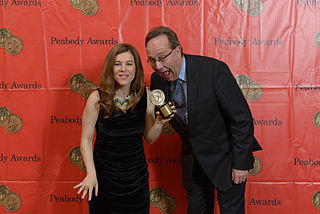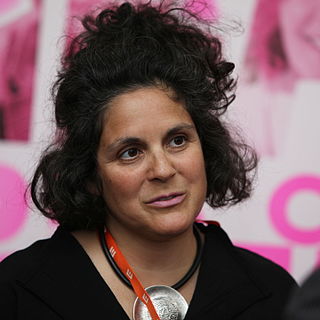Related Research Articles

The National Film Board of Canada is a Canadian public film and digital media producer and distributor. An agency of the Government of Canada, the NFB produces and distributes documentary films, animation, web documentaries, and alternative dramas. In total, the NFB has produced over 13,000 productions since its inception, which have won over 5,000 awards. The NFB reports to the Parliament of Canada through the Minister of Canadian Heritage. It has bilingual production programs and branches in English and French, including multicultural-related documentaries.

Sydney Cecil Newman was a Canadian film and television producer, who played a pioneering role in British television drama from the late 1950s to the late 1960s. After his return to Canada in 1970, Newman was appointed acting director of the Broadcast Programs Branch for the Canadian Radio and Television Commission (CRTC) and then head of the National Film Board of Canada (NFB). He also occupied senior positions at the Canadian Film Development Corporation and Canadian Broadcasting Corporation, and acted as an advisor to the Secretary of State.

The Kainai Nation is a First Nations band government in southern Alberta, Canada, with a population of 12,965 members in 2024, up from 11,791 in December 2013.

James Jude Orbinski is a Canadian physician, humanitarian activist, author, and scholar in global health. Dr. Orbinski began his role as principal of Massey College at the University of Toronto in the 2024-2025 academic year, where he is also Full Professor in the Department of Family and Community Medicine in the Temerty Faculty of Medicine, and is cross-appointed to the Munk School of Global Affairs and Public Policy, as well as the Dalla Lana School of Public Health,. Previously a professor in the Faculty of Health Science at York University, Dr. Orbinski founded the Dahdaleh Institute of Global Health Research.

Alanis Obomsawin, is an Abenaki American-Canadian filmmaker, singer, artist, and activist primarily known for her documentary films. Born in New Hampshire, United States and raised primarily in Quebec, Canada, she has written and directed many National Film Board of Canada documentaries on First Nations issues. Obomsawin is a member of Film Fatales independent women filmmakers.

Women's College Hospital is a teaching hospital in Toronto, Ontario, Canada. It is located in downtown Toronto at the north end of Hospital Row, a section of University Avenue where several major hospitals are located. It currently functions as an independent ambulatory care hospital.
City of Gold is a 1957 Canadian documentary film by Colin Low and Wolf Koenig, chronicling Dawson City during the Klondike Gold Rush. It made innovative use of archival photos and camera movements to animate still images, while also combining narration and music to bring drama to the whole. Its innovative use of still photography in this manner has been cited by Ken Burns as the source of inspiration for his so-called Ken Burns effect, a type of panning and zooming effect used in video production to animate still images.
Bonnie Sherr Klein is a feminist filmmaker, author and disability rights activist.
Kanehsatake: 270 Years of Resistance is a 1993 feature-length documentary film by Alanis Obomsawin, highlighting the events of the 1990 Oka Crisis. Obomsawin documents the events of The Siege of Kanehsatake over 78 days, capturing a rare perspective of an important turning point in Canadian history. Produced by the National Film Board of Canada, the film won 18 Canadian and international awards, including the Distinguished Documentary Achievement Award from the International Documentary Association and the CITY TV Award for Best Canadian Feature Film from the Toronto Festival of Festivals.
The Champions is a three-part Canadian documentary mini-series on the lives of Canadian political titans and adversaries Pierre Elliott Trudeau and René Lévesque.
Bob's Birthday is a 1993 Canadian-British animated short by Alison Snowden and David Fine, winner of the Academy Award for Best Animated Short Film at the 67th Academy Awards, and serves as the pilot to the animated series Bob & Margaret. It features a humorous look at how Margaret plans to throw a surprise birthday party for Bob on his 40th birthday, as he struggles with the sudden impact of middle age. Bob's Birthday has won 10 awards, one of which includes the National Film Board of Canada's 60th Oscar nomination. The film was inspired by the creators, Alison Snowden and David Fine, both turning 30.
Jane Marsh Beveridge was a Canadian director, producer, editor, composer, screenwriter, teacher and sculptor. She was best known as one of the pioneering filmmakers at the National Film Board of Canada (NFB).

Katerina Cizek is a Canadian documentary director and a pioneer in digital documentaries. She is the Artistic Director, Co-Founder and Executive Producer of the Co-Creation Studio at MIT Open Documentary Lab.
John Spotton C.S.C. was a Canadian filmmaker with the National Film Board of Canada.

Pink Ribbons, Inc. is a 2011 National Film Board of Canada (NFB) documentary about the pink ribbon campaign, directed by Léa Pool and produced by Ravida Din. The film is based on the 2006 book Pink Ribbons, Inc: Breast Cancer and the Politics of Philanthropy by Samantha King, associate professor of kinesiology and health studies at Queen's University.

Jennifer Baichwal is a Canadian documentary filmmaker, writer and producer.

Highrise is a multi-year, multimedia documentary project about life in residential highrises, directed by Katerina Cizek and produced by Gerry Flahive for the National Film Board of Canada (NFB). The project, which began in 2009, includes five web documentaries—The Thousandth Tower, Out My Window, One Millionth Tower, A Short History of the Highrise and Universe Within: Digital Lives in the Global Highrise—as well as more than 20 derivative projects such as public art exhibits and live performances.

Albert Kish was a Canadian documentarian/filmmaker.
Roxann (Karonhiarokwas) Whitebean is an independent film director and media artist from the Mohawk Territory of Kahnawake (Canada).

Studio D was the women's unit of the National Film Board of Canada (NFB) and the world's first publicly funded feminist filmmaking studio. In its 22-year history, it produced over 140 films and won 3 Academy Awards. Cinema Canada once called it the "Jewel in the Crown Corporation."
References
- ↑ "House Calls". NFB Collections page. 2006. Retrieved 2009-04-07.
- ↑ Greenaway. Liz (April 2006). "House Calls". Canadian Materials. XII (17). Manitoba Library Association.
- ↑ Brett-MacLean, Pamela (2007-05-27). "The elderly patient: in situ". CMAJ. Canadian Medical Association. Retrieved 2009-04-07.